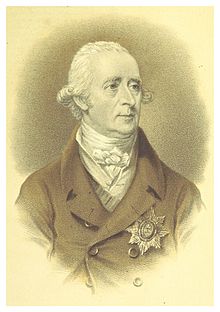Philip Francis (politician)
| Sir Philip Francis | |
|---|---|
 |
|
| Councilor on the Supreme Council of Bengal | |
|
In office 20 October 1774 – 3 December 1780 |
|
|
Member of Parliament for Yarmouth (Isle of Wight) (UK Parliament constituency) |
|
|
In office 1784–1790 |
|
|
Member of Parliament for Bletchingley |
|
|
In office 1790–1796 |
|
|
Member of Parliament for Appleby (UK Parliament constituency) |
|
|
In office 1802–1807 |
Sir Philip Francis (22 October 1740 – 23 December 1818) was an Irish-born British politician and pamphleteer, the supposed author of the Letters of Junius, and the chief antagonist of Warren Hastings. His accusations against the latter led to the impeachment of Warren Hastings and Elijah Impey by Parliament. He belonged to the Whig party.
Born in Dublin, he was the only son of Dr Philip Francis (c. 1708–1773), a man of some literary celebrity in his time, known by his translations of Horace, Aeschines and Demosthenes. He received the rudiments of an excellent education at a free school in Dublin, and afterwards spent a year or two (1751–1752) under his father's roof at Skeyton Rectory, Norfolk, and elsewhere, and for a short time he had Edward Gibbon as a fellow-pupil. In March 1753, he entered St Paul's school, London, where he remained for three and a half years, becoming a proficient classical scholar.
In 1756, immediately on his leaving school, he was appointed to a junior clerkship in the secretary of state's office by Henry Fox (afterwards Lord Holland), with whose family Dr Francis was at that time on intimate terms; and this post he retained under the succeeding administration. In 1758 he was employed as secretary to General Bligh in the expedition against Cherbourg; and in the same capacity he accompanied the Earl of Kinnoull on his special embassy to the court of Portugal in 1760.
...
Wikipedia
